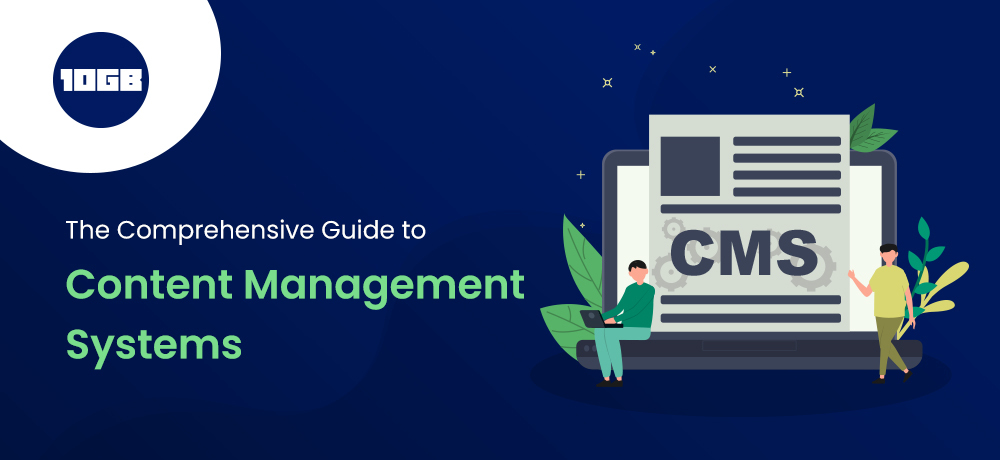In this blog post, we shall be reviewing everything significant regarding the CMS like guides, working of it, its features, myths as well as recommend a few popular Content Management Systems.
Before going ahead let’s know:
What is Content Management System?
A Content Management System is a platform that lets users build a website, store, manage, and publish content online without the need to write to code. Hence CMS allows a person with little or no technical skills to manage daily tasks.
Related: Easy Steps to Build a WordPress Website
How a CMS Works?
Maximum of you have worked with or seen WordPress- most popular CMS with 63.1% of the market share as of April 7, 2020.
With CMS you have an easy interface where you could write or upload your content. It is very much similar to Microsoft word.
However, if you create content without CMS( Content Management System), you not only need to write content but also write its static file and upload it to its server.
In short CMS lets user do everything without having to know or understand how to write code or how the database works.
Features Of CMS
There are several CMSs and each has unique features. That signifies the features of CMS may vary on the kind of Content Management System you pick. Below are some features that every CMS must have;
Flexibility: Though each and every CMSs come equipped with all necessary and fundamental elements, you get full liberty to add unique functionalities, and make it more personalized.
Permission Control: With the permission control feature, the administrator has the authority to allot user roles and enable just the necessary access.
Multilingual Support: While you have a website, blog, or an eCommerce, you may have users across the globe with various language choices. Hence, the website should not be limited to a single language. CMS supports various languages so that your users over the globe can access information by translating the page into their regional language.
Scalable: You may have a goal of development. Your website too will grow, will have more extra users, more services over time. This needs your website to be sturdy enough to manage the incoming traffic and content loads effectively. A CMS is intended to scale up and grow parallel to your business.
Security: Security is the most significant feature that each and every CMS should have. Guaranteeing security is not just essential to protect your website’s data, but also the confidential information of your users. You need to make sure that the CMS you are utilizing gives robust security and comes with regular security updates.
Open API: Open API brings you a few advantages as you are not obliged to follow its default settings and interface. You can integrate tools and change them based on your choices and business needs.
Now as we have discussed features of CMS, let’s move ahead to see some of the CMS that you should know.
Few CMS that you should know
WordPress
WordPress is ruling the race with a 63.1% market share. Almost 35% of the total websites on the Internet are powered by WordPress.
The reason why it is so popular is that it needs no past experience to use. Anyone with surfing knowledge can install it, create a website, and customize it as per their needs.
Additionally, you can read this blog post “Simple Tips For WordPress Optimization” to optimize your WordPress website.
Joomla
Joomla is the second most used Content Management system after WordPress with approximately 2.5 million active websites. It holds more than 4.5% market share. By utilizing Joomla, you can make online portals, online communities, social media networks, etc. with comfort. Few top websites powered by Joomla incorporate;
- LINUX
- IKEA
- Lipton Ice Tea
- UNRIC (United Nations Regional Information Centre for Western Europe)
- The Fashion Spot
- Holiday Inn
- Guggenheim
- The Hill
- ITWire
Drupal
In case you are searching for the best technically advanced CMS that gives full control of the site, then Drupal is a great choice. It is helpful to build more advanced and ambitious websites. Drupal holds approx 3% market share. Few top websites powered by Drupal include;
- Tesla
- NCAA
- Mint
- Le Figaro
- Australian Government
Magento
Magento is well known for building eCommerce sites with more than 250K merchants globally using this CMS. It contributes around 2% CMS market. Top brands’ website powered by Magento are
- Olympus
- Ford
- Cocacola
- FoxCommect
Related: Install Magento 2.4 with Command-Line
Conclusion
Do some research and choose the best CMS that fits your business needs. Talk to 10GB Hosting experts to make an informed decision. Additionally, you can opt for managed WordPress hosting plans to foster your needs.
